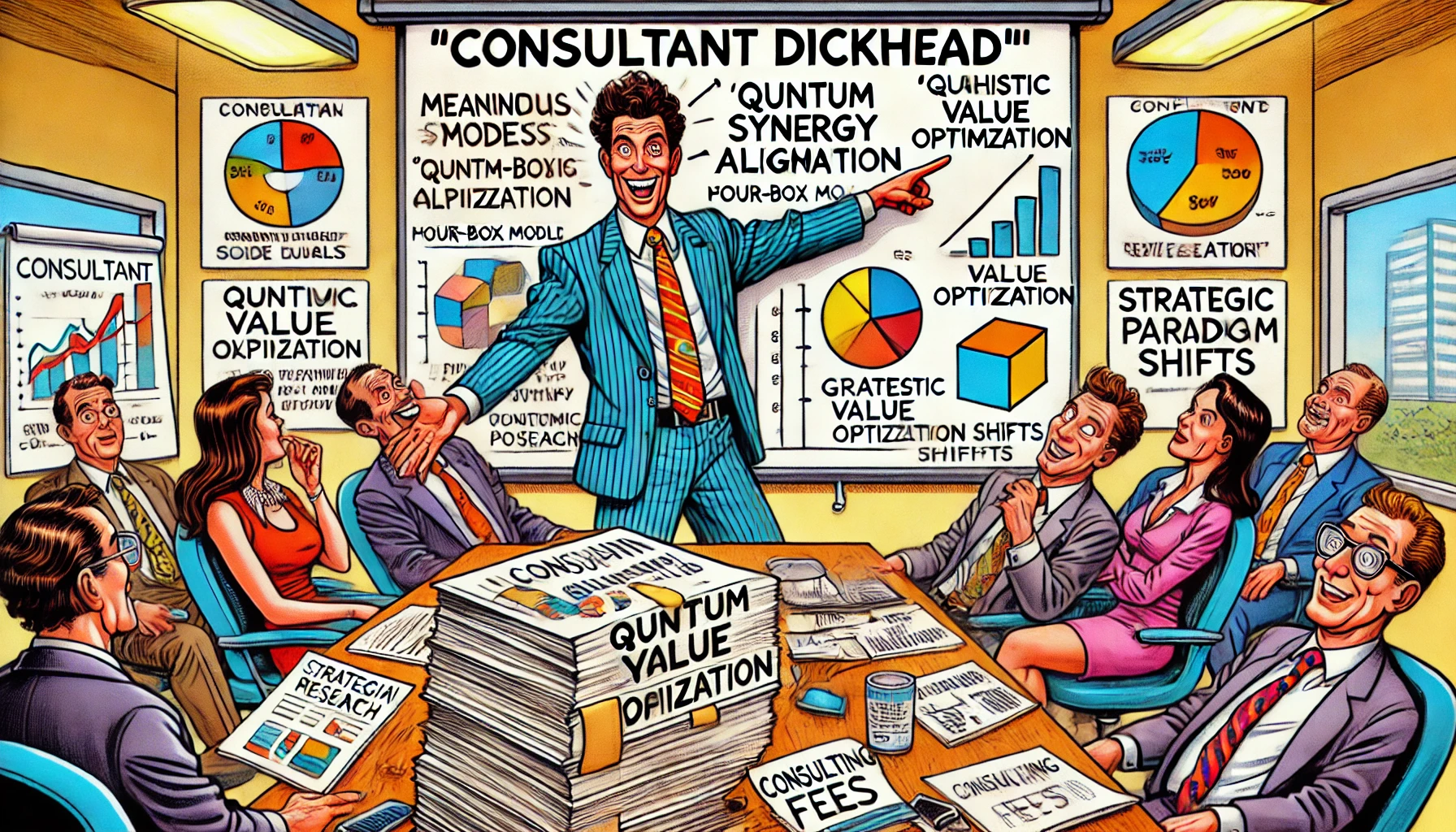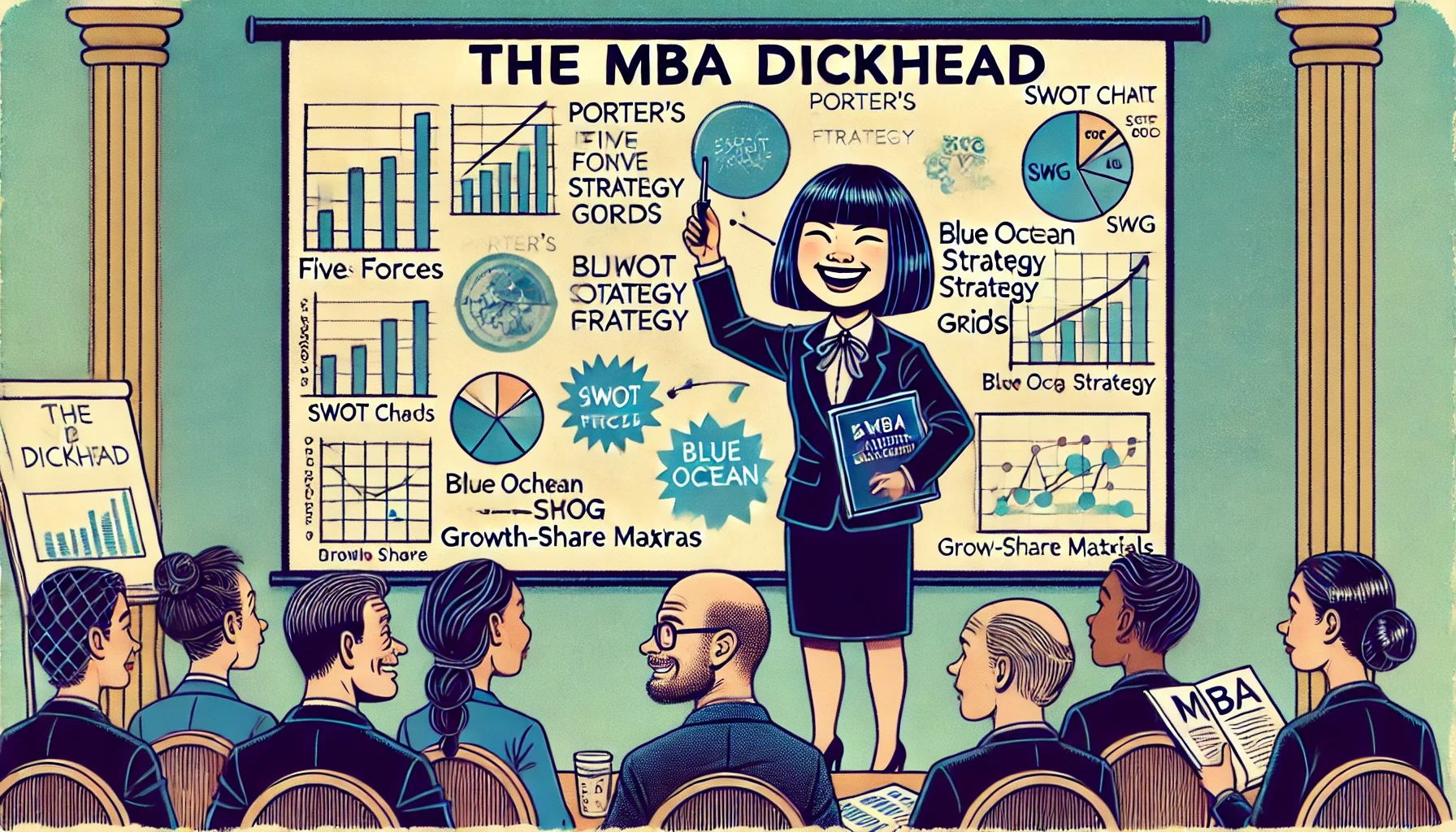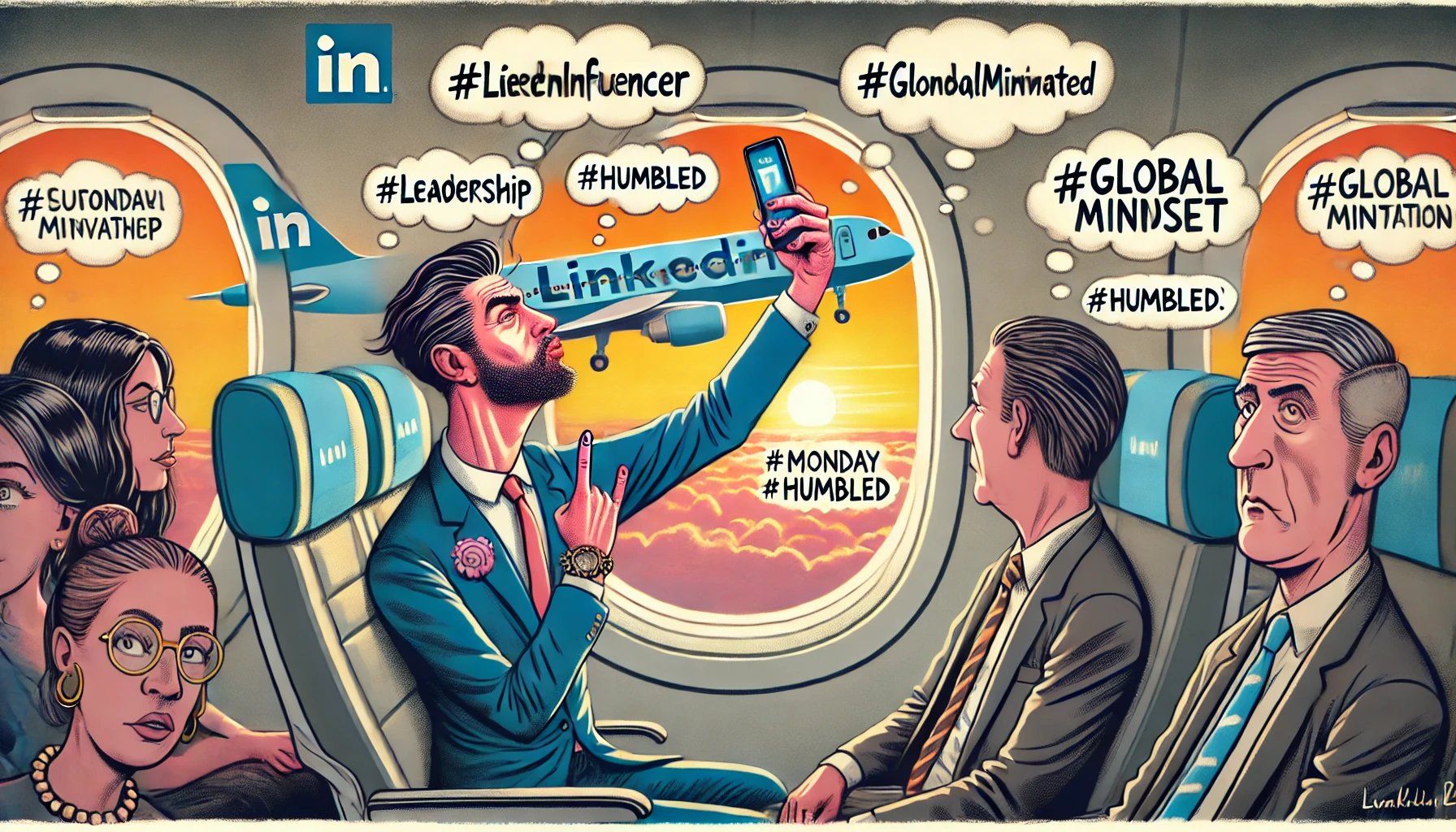The Consultant Dickhead: The Outsourced Genius Who Sells You Your Own Ideas
Definition: A Unique Breed of Workplace Nonsense
The Consultant Dickhead is a special strain of corporate absurdity – an external “expert” who parachutes into your company, siphons knowledge from the people who actually do the work, and then sells it back to your boss as a revelation. He’ll rebrand your ideas in a polished PowerPoint and present them to senior management as if he’s just discovered fire. It’s the ultimate invoice alchemy: turning your insights into billable hours at exorbitant rates. This breed thrives on the notion that confidence is king – in their world, expertise = 90% bluster + 10% a recycled four-box framework from their last client. In short, the Consultant Dickhead convinces everyone that your simple idea is a stroke of genius because he’s the one presenting it.
Parody Scenario: A Day in the Life of a Consultant Dickhead
Imagine a day with our beloved Consultant Dickhead, where every hour is a theater of the absurd. From dawn till dusk, he repackages the obvious as visionary insight. Here’s a timeline of a typical engagement, showcasing how effortlessly he turns a normal workday into a masterclass of consultant flimflam:
-
8:45 AM – Grand Entrance and Guru Aura: Clad in a sharp suit and brimming with confidence, the consultant strides into the office lobby. He kicks off the day by regaling everyone with a well-rehearsed tale of how he’s “transformed businesses” just like yours. In reality, all he’s done so far is memorize your company’s org chart and drink your coffee, but the guru act is already in full swing.
-
10:00 AM – Information Mining (Disguised as “Assessment”): The consultant corrals various team members into back-to-back “deep-dive” meetings. He takes copious notes on everything you explain – your processes, your pain points, the solutions you’ve been pushing for ages – yet offers zero original insight of his own. Every so often he nods sagely and drops a buzzword like “synergy” or “benchmarking” to feign expertise. By lunch, he’s essentially compiled your collective knowledge and labeled it “confidential research.”
-
1:00 PM – The Lockdown (Slide Deck Prep): After siphoning all that information, our Consultant Dickhead disappears into a conference room (or his hotel business suite) to work on the deliverable. This mostly involves pasting your ideas into a pre-fabricated consulting template, complete with a snazzy title. He conjures up a fancy 2×2 matrix (because no consultant engagement is complete without a four-quadrant diagram) and slaps a trademark-worthy label on it. By 2:59 PM, the deck is titled something like “Operational Excellence Framework” and promises to “streamline synergistic efficiencies” – which, in plain English, means absolutely nothing new.
-
3:00 PM – The Big Reveal Presentation: Time to shine. The consultant gathers the executives and unveils his masterpiece: a slideshow called “Operational Excellence: A Roadmap to Success,” filled with a summary of everything the employees already told him and a glossy framework he just learned last week. His “groundbreaking” recommendations? Work more efficiently. Be more productive. Focus on growth. (No kidding!) Senior leaders sit entranced as he delivers these obvious points with utmost gravitas. They’ve “never seen their own company’s knowledge arranged so neatly in a $200,000 PowerPoint” and are duly impressed. Meanwhile, employees in the room exchange glances, puzzled that this is being treated as insight. One brave soul finally raises a hand and asks, “So… you’re saying we should work more efficiently?” The Consultant Dickhead, without missing a beat, nods and replies, “Yes. With a synergistic approach.”. Cue the mic drop moment.
-
3:30 PM – Applause, Confusion, and Credit Theft: The room falls silent, then erupts in applause. The CEO beams, lauding the consultant’s “fresh perspective”. (Fresh, indeed – your ideas never sounded so impressive until an outsider repeated them on a fancy slide.) The Consultant Dickhead graciously soaks in the praise. Your boss now believes hiring him was a stroke of genius. And you? You’re left dazed, watching someone get a standing ovation for parroting advice that’s been sitting in your project docs for months.
-
4:00 PM – The Exit (Onto the Next Victim): With the “initiative” declared a success and a promise of follow-up (perhaps another lucrative consulting phase), our hero packs up to catch an early flight. He leaves behind a stack of invoices and a trail of jargon. By 4:01 PM, he’s already texting his team about the next client, where he’ll rinse and repeat this routine. The executives congratulate each other on finding such an innovative expert, and the employees shuffle back to work, wondering what just happened. Another day, another Consultant Dickhead triumph.
Why They Exist: The Corporate Culture That Enables Them
The Consultant Dickhead isn’t an accident; he’s a product of business culture. Organizations inadvertently breed these characters due to a mix of corporate insecurity, leadership laziness, and the polished illusion of expertise that consultants provide:
-
Corporate Insecurity & External Validation: Many companies suffer from a “not-invented-here” complex – an idea isn’t truly valued until an expensive outsider validates it. As the saying goes, businesses love external validation. You could repeat an idea for years and be ignored, but when a high-paid consultant says the exact same thing in a nice deck, it suddenly becomes gospel. Hiring a consultant gives insecure executives cover: “See? A reputable outside expert agrees with us, so it must be right.” Nothing bolsters confidence in a decision like paying someone from out of town to nod in agreement.
-
Executive Laziness & Scapegoats: Bringing in consultants can be a form of outsourcing the thinking (and sometimes the blame). Why do the heavy lifting of problem-solving when you can pay someone to do it for you? Some executives would rather write a check than roll up their sleeves. Plus, if the consultant’s grand plan doesn’t pan out, leadership has a handy scapegoat. The Consultant Dickhead certainly won’t blame himself – if the advice fails, he’ll claim “poor execution” was the issue. This implicit blame-shifting means either the employees or the circumstances take the fall, not the genius who crafted the plan. For a lazy or risk-averse exec, it’s a win-win: they get to appear proactive by hiring help, and if things go south, the failure wasn’t in their strategy – it was in the implementation by underlings.
-
Illusion of Expertise: Let’s face it, a slick-talking outsider with fancy slides looks clever. The Consultant Dickhead leverages this to the hilt. By packaging common sense in highfalutin jargon and shiny frameworks, they create an aura of innovation that impresses those who don’t know better. It’s theatrical: the confident delivery, the buzzwords (“holistic synergy assessment,” “value-stream maximization” – whatever that means), and the logo of a big consulting firm on the cover all combine to suspend disbelief. Executives can tell themselves they’re hearing cutting-edge wisdom, not just a repackaging of what their own people have said. The illusion is powerful – after all, if the solution comes with a six-figure invoice and an air of mystique, it must be special, right?
In short, Consultant Dickheads thrive in environments where internal voices are ignored and decision-makers crave the safety of a second opinion – no matter how redundant it may be. Corporate culture hands them the keys to the kingdomby assuming that outsider = smarter.
How to Spot One: Telltale Behaviors and Jargon
Think you might have a Consultant Dickhead in your midst? Here are the giveaway signs that you’re dealing with this particular species of workplace nuisance:
-
The Grandiose Origin Story: They introduce themselves with a flourish, touting a track record of big-name clients and bragging about how they’ve “transformed businesses” just like yours – often before they’ve even seen your internal data. (Bonus points if they drop a reference to a Fortune 500 company within the first five minutes.)
-
Notebook Full of Your Ideas: They’re always scribbling in a notebook or typing into their tablet during meetings. At first this seems diligent – until you realize they’re writing down everything you say and contributing nothing original. Their notes are basically your team’s collective wisdom, which they plan to re-gift to upper management under their own branding.
-
Jargon Overdose: A true Consultant Dickhead speaks in a dialect of pure corporate gibberish. Your meetings will be peppered with terms like “synergy,” “leverage,” “low-hanging fruit,” and “paradigm shift” at an alarming rate. If someone manages to use “robust scalable ecosystem” and “quick wins” in the same breath, you can bet they’re in the club. (They’ll also trademark the most mundane concepts – prepare for ™ symbols on phrases that existed long before they arrived.)
-
Shockingly Obvious Insights: Check their big recommendations. Are they essentially repackaged truisms? Consultant Dickheads excel at presenting obvious ideas as breakthrough insights. If the “game-changing strategy” boils down to “increase sales” or “reduce costs” (delivered with a fancy chart), and everyone nods as if it’s profound, you’ve got one.
-
Instant Industry Expert (Just Add Water): Perhaps the funniest hallmark – within a day or two, this person acts like they know your business better than those who’ve been there for 10 years. It’s not uncommon to see a Consultant Dickhead magically become an “expert” in your industry after 48 hours on-site. They’ll start sentences with “In this industry, what you need to do is…” while veteran employees silently facepalm. Their confidence is inversely proportional to their actual understanding.
If you observe these behaviors – the overconfident intro, the note-taking sponge act, the avalanche of buzzwords, the duh-inducing advice, and the overnight expertise – congratulations, you’ve got a Consultant Dickhead on your hands. At least now you can identify the creature in the wild.
How to Deal With Them: A Humorous Survival Guide
Dealing with a Consultant Dickhead is a bit like sparring with a professional bullshitter – you need tact, strategy, and a sense of humor. Here are some tongue-in-cheek yet practical tips to counter their influence, prevent them from outmaneuvering you, and maybe even use their own tactics to your advantage:
-
Force Original Thinking: Don’t let them get away with simply regurgitating your ideas in shiny packaging. Pin them down on specifics. Ask pointed questions that can’t be answered with recycled platitudes. For example, if they declare you need a “strategic realignment of workflows,” respond with “Great, what exactly would you change first?” Make it clear that you expect new, concrete solutions – not just a rehash of what you already know. By pushing them beyond generic statements, you compel the Consultant Dickhead to actually earn their pay (or squirm trying).
-
Demand Transparency: Shine a light on their work. Insist on seeing the data behind their conclusions and the sources of their so-called insights. If a consultant claims “industry best practices say X,” politely ask, “Could you share which industry study or data set that’s from?” When they recommend a tool or process, request a demo or evidence of where it has worked before. In short, ask for receipts. Consultant Dickheads prefer to operate like black boxes of wisdom – opening that box and peeking inside is your best defense. If all they’ve done is re-label your internal reports, calling it out (tactfully, in front of others) will deflate their balloon quickly.
-
Keep Ownership of Ideas: This one’s key for protecting your hard work. Whenever you share an insight or provide information to a consultant, document it. Follow up meetings with summary emails (copying relevant higher-ups) that clearly attribute the ideas discussed. That way, if you later see your suggestion appear in their presentation, you have an email trail to point to. You can even preemptively mention to your boss, “I walked the consultant through our current efficiency plan on Monday.” This lays a subtle claim. Think of it as tagging your idea before letting it out into the wild. When the Consultant Dickhead tries to release your idea back into the company ecosystem as part of their “expert recommendations,” everyone will already know it was spotted in your territory first.
-
Set Expectations Upfront: From day one, define what success looks like for the consultant’s engagement. Pin down clear deliverables, timelines, and metrics. For example, make it part of their contract that they must provide three original improvement proposals, or require them to pilot one of their recommendations on a small scale. When a Consultant Dickhead realizes there are specific targets and that you’ll be measuring their contributions, it tamps down their ability to just shuffle your own ideas around. It also helps to schedule progress check-ins where they must preview their findings to a mixed group (including those who gave them the info). This prevents the classic end-of-project “ta-da!” moment where they unveil your ideas as their own – because your team will see it coming and can call it out.
-
Leverage Their Influence to Your Advantage: If you can’t beat ’em, use ’em. It’s no secret that some execs only believe something if an outside consultant says it. Frustrating as that is, you can turn it in your favor. Steer the Consultant Dickhead toward validating the ideas you and your team have had all along. Feed them the information and perspective that support the changes you want to see, and let them package it up and sell it to leadership. Yes, they’ll get the credit – but you’ll get the result. In a way, the consultant becomes an unwitting megaphone for your agenda. It’s judo: using their own momentum (and ego) to push through the outcome you wanted in the first place. You might not get public applause, but you’ll get a quiet victory as you watch the Consultant Dickhead champion your plan as the Next Big Thing.
Finally, keep your sense of humor. The absurdity of the Consultant Dickhead is often best met with a healthy dose of skepticism and a wry smile. Remember that their power comes from perception. Once you and your colleagues see through the charade, the Consultant Dickhead loses much of his grip. In the end, for all the buzzwords and bravado, a consultant’s fancy report is just repackaged common sense. And if they’re not bringing any truly fresh ideas to the table, then they’re really just expensive middlemen selling you your own ideas. With a bit of savvy, you can cut through the nonsense, protect your work, and maybe even have a laugh as the Consultant Dickhead tries to hawk your wisdom right back to you. After all, the joke’s on them when everyone knows exactly what game is being played.




One Response
this is so true